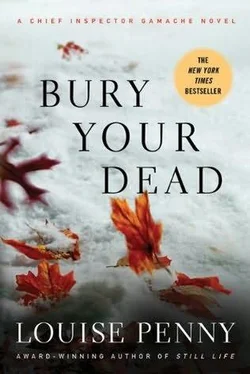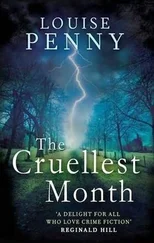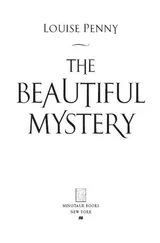Louise Penny - Bury Your Dead
Здесь есть возможность читать онлайн «Louise Penny - Bury Your Dead» весь текст электронной книги совершенно бесплатно (целиком полную версию без сокращений). В некоторых случаях можно слушать аудио, скачать через торрент в формате fb2 и присутствует краткое содержание. Жанр: Старинная литература. Описание произведения, (предисловие) а так же отзывы посетителей доступны на портале библиотеки ЛибКат.
- Название:Bury Your Dead
- Автор:
- Жанр:
- Год:неизвестен
- ISBN:нет данных
- Рейтинг книги:4 / 5. Голосов: 1
-
Избранное:Добавить в избранное
- Отзывы:
-
Ваша оценка:
- 80
- 1
- 2
- 3
- 4
- 5
Bury Your Dead: краткое содержание, описание и аннотация
Предлагаем к чтению аннотацию, описание, краткое содержание или предисловие (зависит от того, что написал сам автор книги «Bury Your Dead»). Если вы не нашли необходимую информацию о книге — напишите в комментариях, мы постараемся отыскать её.
Bury Your Dead — читать онлайн бесплатно полную книгу (весь текст) целиком
Ниже представлен текст книги, разбитый по страницам. Система сохранения места последней прочитанной страницы, позволяет с удобством читать онлайн бесплатно книгу «Bury Your Dead», без необходимости каждый раз заново искать на чём Вы остановились. Поставьте закладку, и сможете в любой момент перейти на страницу, на которой закончили чтение.
Интервал:
Закладка:
It was of a man looking out over the city he’d founded four hundred years earlier.
Samuel de Champlain.
Bare-headed, bold, stepping forward as though wanting to join them, to be a part of this city that existed only because he had. And at the base of the statue another, smaller, image. An angel, sounding a trumpet to the glory of the founder. And even Gamache, who was no great fan of nationalism, felt wonder, awe, at the unshakable vision and courage of this man to do what many had tried and failed.
To not just come to these shores to harvest furs and fish and timber, but live here. Create a colony, a community. A New World. A home.
Gamache stared until he could no longer feel his face and his fingers in his warm mitts were numb. But still he stared at the father of Québec and wondered.
Where are you? Where did they bury you? And why don’t we know?
Émile rose and waved him to their table by the window.
The two men with him also got up.
“Chief Inspector,” they said and introduced themselves.
“René Dallaire,” the tall, rotund man said, shaking Gamache’s hand.
“Jean Hamel,” the small, slim one said. Had René sported a cropped moustache the two men could have passed for Laurel and Hardy.
Gamache handed his coat to a waiter, shoving his hat, scarf and mitts into a sleeve. He sat and put his hands to his face, feeling the burning. Extreme cold left its ironic mark. It was indistinguishable from a sunburn. But within minutes it had subsided, and the circulation had returned to his hands, helped along by sitting on them.
They ordered drinks and lunch and chatted about Carnaval, about the weather, about politics. It was clear the three men knew each other well. And Gamache knew they’d all belonged to the same club for decades.
The Champlain Society.
Their drinks and a basket of rolls arrived. They sipped their Scotches and Gamache resisted the urge to take a warm roll in each hand. The men talked casually among themselves, Gamache sometimes contributing, sometimes just listening, sometimes glancing out the window.
The St-Laurent Bar was at the far end of the Château, down the gracious, wide, endless corridor, through the double doors and into another world. Unlike the rest of the mammoth hotel, this bar was modest in size and circular, being built into one of the turrets of the Château. Its curved walls were paneled in dark wood and fireplaces stood on either side. A round bar took up the center, with tables surrounding it.
That, for any normal place, would have been impressive enough but Quebec City was far from normal, and within it, the Château was unique.
For curving along the far wall of the bar were windows. Tall, framed in mahogany, wide and mullioned. Out of them opened the most splendid vista Gamache had ever seen. True, as a Québécois, no other view could ever match up. This was their Grand Canyon, Niagara Falls, Everest. This was Machu Picchu, Kilimanjaro, Stonehenge. It was their wonder.
From the bar he could see up and down the great river, the view so distant it broke into the past. From there, Gamache could see four hundred years in the past. The ships, surprisingly small and fragile, sailing down from the Atlantic, dropping anchor at the narrowest spot.
Kebek. An Algonquin word. Where the river narrows.
Gamache could almost see the sails being furled, men pulling ropes, securing lines, crawling up and down the masts. He could almost see the boats lowered into the water, and the men rowing ashore.
Did they know what they were in for? What the New World held?
Almost certainly not, or they’d never have come. Most never left, but were buried right below them, on the shores. Dying of scurvy, of exposure.
Unlike Gamache they had no Château to duck into. No warm soup and amber Scotch. He’d barely survived ten minutes in the biting, bitter wind, how had they survived days, weeks, months, with no warm clothing and barely any shelter?
Of course, the answer was obvious. They hadn’t. Most had died, slow, agonizing, dreadful deaths those first winters. What Gamache saw as he glanced out the window to the river with its gray water and ice floes, was history. His history, flowing by.
He also saw a dot in the distance. An ice canoe. Shaking his head Gamache turned his attention back to his companions.
“Why’re you looking so puzzled?” Émile asked.
The Chief Inspector nodded out the window. “An ice canoe team. The settlers had to do it. Why would someone choose to?”
“I agree,” said René, breaking up a roll and smearing butter on it. “I can barely watch them, and yet, I can’t seem to look away either.” He laughed. “I sometimes think we’re a rowboat society.”
“A what?” asked Jean.
“A rowboat. It’s why we do things like that.” He jerked his head toward the window and the dot on the river. “It’s why Québec is so perfectly preserved. It’s why we’re all so fascinated with history. We’re in a rowboat. We move forward, but we’re always looking back.”
Jean laughed and leaned away as the waiter placed a huge burger and frites in front of him. A bubbling French onion soup sat in front of Émile and Gamache was given a hot bowl of pea soup.
“I met a fellow this morning who’s training for the race,” said Gamache.
“Bet he’s in good shape,” said Émile, lifting his spoon almost over his head, trying to get the stringy, melted cheese to break.
“He is. He’s also the minister at the Presbyterian church. St. Andrews.”
“Muscular Christianity,” René chuckled.
“There’s a Presbyterian church?” asked Jean.
“And a congregation to go with it,” said Gamache. “He was saying he has a teammate for the race who’s over sixty.”
“Sixty what?” asked René. “Pounds?”
“Must be IQ,” said Émile.
“I’m hoping to meet him this afternoon. Name’s Ken Haslam. Do you know him?”
They looked at each other, but the answer was clear. No.
After lunch, over espressos, Gamache turned the conversation to the reason they were together.
“As you know, Augustin Renaud was murdered on Friday night, or early yesterday morning.”
They nodded, their good cheer subsiding. Three shrewd faces stared back at him. They were of an age, late seventies, all successful in their fields, all retired. But none had lost their edge. He could see that clearly.
“What I want to know from you is this. Could Champlain be buried beneath the Literary and Historical Society?”
They looked at each other, and finally, silently, it was decided that René Dallaire, the large, Hardy-esque man, would take the lead. The table had been cleared of all but their demi-tasses .
“I brought this along when Émile told us what you wanted to talk about.” He spread out a map, pinning it down with their cups. “I’m embarrassed to say I had no idea there was a Literary and Historical Society.”
“That’s not quite true,” said Jean to his friend. “We’re familiar with the building. It’s quite historic you know. Originally a redoubt, a military barracks in the 1700s. Then in the latter part of the century it housed prisoners of war. Then another prison was built somewhere else and the building must have fallen into private hands.”
“And now you say it’s called the Literary and Historical Society?” René spoke the English words with a heavy accent.
“Quite magnificent,” said Gamache.
René placed his substantial finger on the site of the building, by rue St-Stanislas. “That’s it, right?”
Gamache bent over the map, as did they all, narrowly avoiding knocking heads. He nodded agreement.
“Then there can be no doubt. You agree?” René Dallaire looked at Jean and Émile.
Читать дальшеИнтервал:
Закладка:
Похожие книги на «Bury Your Dead»
Представляем Вашему вниманию похожие книги на «Bury Your Dead» списком для выбора. Мы отобрали схожую по названию и смыслу литературу в надежде предоставить читателям больше вариантов отыскать новые, интересные, ещё непрочитанные произведения.
Обсуждение, отзывы о книге «Bury Your Dead» и просто собственные мнения читателей. Оставьте ваши комментарии, напишите, что Вы думаете о произведении, его смысле или главных героях. Укажите что конкретно понравилось, а что нет, и почему Вы так считаете.











